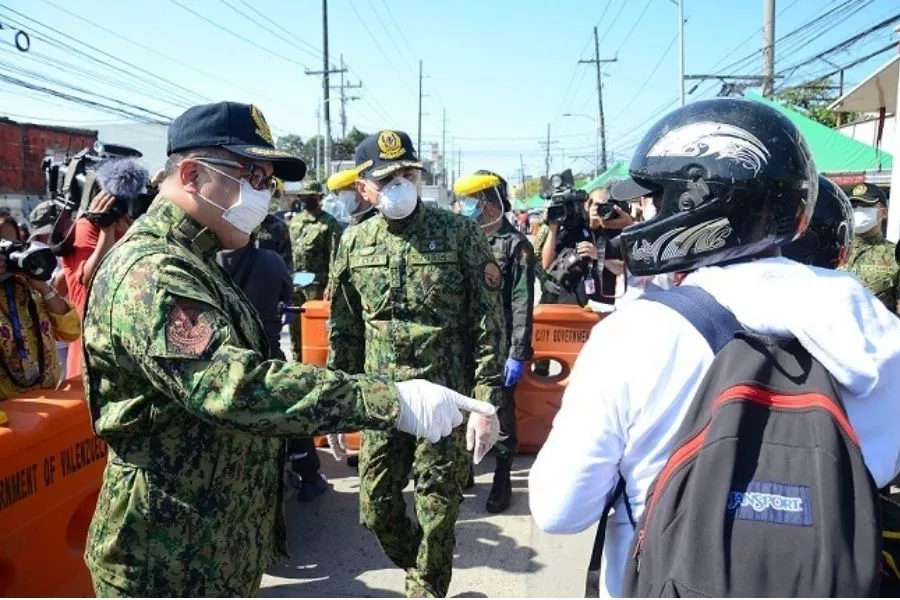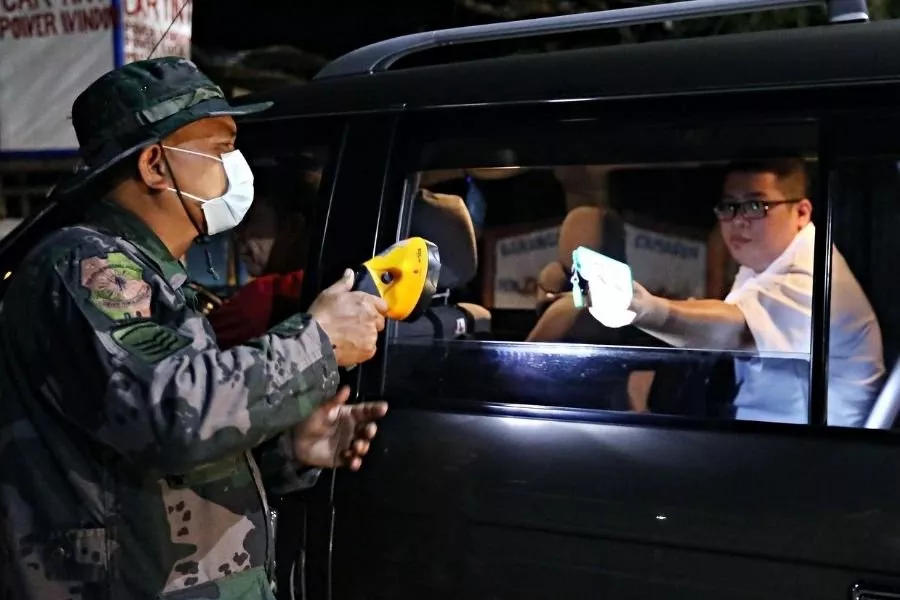The National Captial Region (NCR) is once again placed under the strictest quarantine classification to help curb the rising COVID-19 Delta variant cases. The implementation of the Enhanced Community Quarantine (ECQ) in NCR started last August 6, and it will be in effect until August 20.

APORs need to present valid IDs or other necessary documents at checkpoints
Checkpoints are placed in key locations in NCR to contain the movement of people that will aid in containing the spread of the COVID-19 Delta variant. The Department of Interior and Local Government (DILG) previously said that checkpoints are manned by the Joint Task Force COVID Shield, a team composed of the Philippine National Police (PNP), Armed Forces of the Philippines, Philippine Coast Guard, and the Bureau of Fire Protection.
Authorized Persons Outside of Residence (APOR) are the only individuals allowed to move around Metro Manila as per guidelines of the Inter-Agency Task Force (IATF).
On the other hand, vaccination rollout will still push through during the ECQ period. The Metro Manila Council (MMC) said that individuals who are scheduled to be vaccinated during the ECQ period will be exempted from the curfew hours, and will be allowed to go outside their residences.

Curfew hours in NCR will be from 8 p.m. to 4 a.m. until August 20
The MMC, composed of 17 Metro Manila mayors, unanimously agreed to implement longer curfew hours during ECQ. As such, the curfew hours in NCR will be from 8 p.m. to 4 a.m. until August 20.
Public transportation is still available during ECQ but will only allow APORs with valid ID to get onboard. APORs can now also be fetched by Non-APORs, according to Philippine National Police Chief General Guillermo Eleazar.
Aside from the NCR, the following are also under ECQ: Laguna, Iloilo City, and Cagayan de Oro.
Here is the complete list of APORs as per the IATF:
1. Persons traveling to access essential goods and services (such as to buy groceries and medicines, and availing of DFA consular services with confirmed appointments), and for medical or humanitarian reasons, including those leaving their residence to be vaccinated (with proof of schedule).
2. Employees/workers of public and private hospitals, health, emergency, and frontline services, including those working in hospitals, dialysis centers, chemotherapy centers, HMOs/ health insurance providers, as well as disaster risk reduction management officers, public safety officers, and uniformed personnel.
3. Employees/workers of manufacturers of medicines and vitamins, medical supplies, devices, and equipment, including suppliers of input, packaging, and distribution.
4. Employees/workers in industries involved in agriculture (crops, fruits, vegetables, livestock, and poultry), forestry, fishery, and such other components of the food value chain and their workers, including farmers and fisherfolks.
5. Employees/workers of logistics service providers (delivery and courier services; cargo handling; warehousing; trucking; freight forwarding; shipping, port and terminal operators including contractors in port terminals and ancillary services).
6. Employees/workers in essential and priority construction projects, whether public or private, in accordance with the guidelines issued by the Department of Public Works and Highways (DPWH), including contractors, subcontractors, and consultants of the Department of Transportation (DOTr) for the construction of the “Build Build Build” flagship infrastructure projects.
7. Employees/workers involved in manufacturing related to food and other essential goods such as but not limited to soap and detergents, diapers, personal hygiene products, toilet paper, and wet wipes, and disinfectants.
8. Employees/workers involved in the manufacturing, distribution, and/or supply of equipment or products necessary to perform construction or maintenance work, such as cement and steel, or spare parts.
9. Employees/workers in essential retail trade and service establishments such as public markets, supermarkets, grocery stores, convenience stores, pharmacies or drug stores, hardware, office supplies, bicycle shops, laundry shops, and water-refilling stations.
10. Employees/workers in food preparation establishments such as kiosks, commissaries, restaurants, and eateries, but limited to take-out and delivery.
11. Employees/workers in public and private financial service providers involved in the distribution of government grants and amelioration subsidies.
12. Employees/workers in business process outsourcing establishments (BPOs), export-oriented businesses, including mining, and quarrying activities.
13. Public transport providers and public utility vehicle operators, and their workers (i.e. Drivers, Conductors, Terminal Workers).
14. Employees/workers in media establishments and their total permanent staff complement, inclusive of reporters and other field employees.
15. Employees/workers providing dental (emergency cases only), rehabilitation, optometry, and other medical clinics for the treatment of illnesses or injuries.
16. Employees/workers in veterinary clinics
17. Employees/workers in banks, money transfer services, including pawn shops (only for money transfer functions), microfinance institutions, and credit cooperatives, including their armored vehicle services.
18. Employees/workers in capital markets, including the Bangko Sentral ng Pilipinas, Securities and Exchange Commission, Philippine Stock Exchange, Philippine Dealing and Exchange Corporation, Philippine Securities Settlement Corporation, and Philippine Depository and Trust Corporation.
19. Employees/workers of water utilities including their third-party contractors and service providers, building utility services, janitorial/sanitation services, and facilities, including waste disposal services, and property management services.
20. Employees/workers in energy sector establishments (oil, gas, and power companies) and their third-party contractors and service providers, including electric transmission and distribution, electric power plant and line maintenance, electricity market and retail suppliers, and those involved in the exploration, operations, trading, and delivery of any kind of fuel used to produce power, such as gasoline stations, refineries, liquefied petroleum gas stations, and depots.
21. Employees/workers in telecommunications companies, internet service providers, cable television providers, including those who perform indirect services such as technical, sales, and other support personnel, as well as the employees of their third-party contractors doing sales, installation, maintenance, and repair works.
22. Employees/workers in airline and aircraft maintenance, pilots and crew, including employees of aviation schools for purposes of the pilot’s recurrent training for flight proficiency and type rating using simulator facilities; and ship captains and crew, including shipyard operations and repair.
23. Employees/workers in funeral and embalming services.
24. Security personnel licensed by the PNP-Supervisory Office for Security and Investigation Agencies.
25. Employees/workers of printing establishments authorized by the Bureau of Internal Revenue and those contracted by other government agencies.
26. Employees/workers involved in the repair and maintenance of machinery and equipment, for households and establishments permitted to operate under an ECQ.
27. Employees/workers involved in the repair and maintenance of motorized and non-motorized vehicles, including the sale of spare parts.
28. Employees/workers in the leasing of real and personal properties.
29. Employees/workers in the recruitment and placement sector.
30. Teachers, professors, and other staff for purposes of conducting online/offline, and flexible classes, completion of grades, and processing of student credentials, requirements, and documents.
31. Lawyers only when required to provide on-site legal representation necessary to protect rights of persons, whether natural or juridical.
32. Employees/workers of all other establishments, only if necessary for the buying and selling of consumer goods or services via the internet in behalf of such establishment.
33. Employees/workers in agencies and instrumentalities of the government required to work on-site, including government officials and employees on official travel.
34. Officials and employees of foreign diplomatic missions and international organizations accredited by the Department of Foreign Affairs (DFA), whenever performing diplomatic functions and subject to the guidelines issued by the DFA.
35. Employees/workers of hotels and accommodation establishments allowed to operate during ECQ under pertinent rules of the Department of Tourism (DOT).
36. Pastors, priests, rabbis, imams, or other religious ministers and their assistants conducting religious services through online video recording and transmission, or presiding over necrological services, wakes, inurnment, and funerals.
37. Payroll managers and other employees required for the processing of payroll.
38. Duly authorized humanitarian assistance actors (HAAs), especially those transporting medical supplies and laboratory specimens related to COVID-19, and other relief and humanitarian assistance.
39. Persons going to and from the airport, including Overseas Filipino Workers (OFWs) carrying Overseas Employment Certificates.
40. Repatriated OFWs or returning OFWs who have been issued a Bureau of Quarantine/DOH quarantine certificate en route to their final destination in the Philippines.
41. Employees/workers of private shuttle services catering to establishments permitted to operate during ECQ.
Visit Philkotse.com for more automotive news, and the latest traffic updates.
Recent posts
- pnp ncr tiny bubbles Aug 06, 2021
- Updated PUV passenger capacity ECQ Aug 05, 2021
- pnp allows apor fetchers Aug 05, 2021
- MMDA COVID-19 delta curfew Jul 26, 2021











